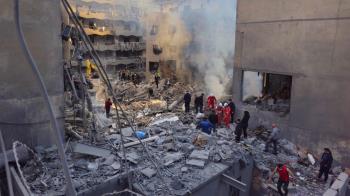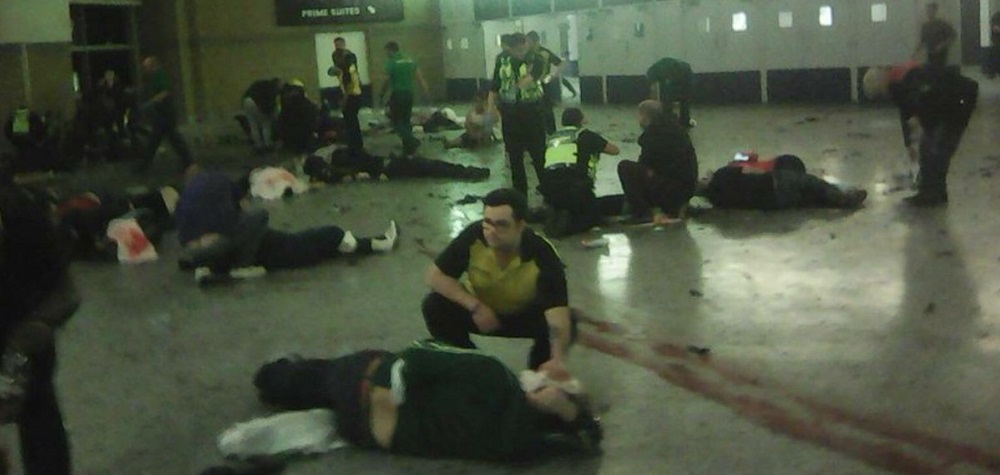Alwaght- The Manchester Ariana Grande concert suicide attack, that the ISIS terrorist group claimed responsibility for, like many other terror attacks in the heart of Europe in past few years sent a new warning signal to the Western leaders that terrorism, violence, and radicalism recognizes no geographical borders, and that fighting this phenomenon takes a strong international will and transparency in policies.
Meanwhile, there is a question: What factors did encourage spread of terrorism across the European countries?
Before blaming the attack only on terrorists, one should focus on the Western countries' policies across the world that gave rise to terrorism and also the form of their fight against it. In fact, in order to analyze roots of terrorism and the reasons behind its flourishing worldwide, we should consider the Western double standards and lack of a serious determination to fight the terrorists as fundamental factors. Moreover, the faulty last decades' policies of the Western governments, topped by the US and Britain, have contributed to growth of terrorism.
West’s wrong policies in West Asia
A look at the course of creation of the biggest terror organizations in the region such as Taliban and al-Qaeda who are godfathers of a majority of the regional terrorist groups like ISIS and al-Nusra Front shows that the US-led Western countries nurtured and supported the initial extremist groups. The excuse for such nurturing was the fight against the Soviet army that invaded and occupied Afghanistan in the 1980s. The West, actually, took advantage of these extremist groups to check a spread of the rival communism.
When the Soviet Union collapsed in the 1990s, the West kept supporting the anti-Shiite Wahhabi takfiris. This time, the excuse was rise of the Shiite Islamic Republic of Iran whose ideology and agenda was on a collision course with the Western policies and interests not only in the region but also in the world.
The West in the early 2000s occupied Afghanistan and Iraq following the 9/11 attacks. The Western campaign led to a full decline of the political, economic, and social structures in these two countries. The total collapse consequently created a vacuum of power. Terrorist groups like al-Qaeda found the disordered and insecure atmosphere appropriate to plant and nurture its takfiri ideology and recruit fighters to push forward its regional agenda.
The Arab uprisings of 2011 provided the West with another pretext to repeat its earlier policies. The NATO members toppled the former Libyan leader Muammar Gaddafi by launching a military campaign during which they reportedly backed extremist militant groups like Libyan Islamic Fighting Group (LIFG).
According to media reports, Salman Abedi, Manchester suicide bomber and his father, Ramadan, had Long-standing links to LIFG.
The controversy centers on the role of the Libyan Islamic Fighting Group (LIFG), which was both an anti-Gaddafi and al-Qaeda subsidiary in the North African state.
Many of the fighters which formed the group in the mid-90s were veterans of the Afghan-Soviet war from the 1980s. They went on to fight the Gaddafi regime in Libya itself.
The war saw the overthrow of the Gaddafi regime and the eventual murder of the leader himself after he was captured by opposition fighters.
Since NATO’s intervention, Libya has been in chaos, suffering a period of insecurity, domestic war, and proliferation of the terrorist groups like al-Qaeda and ISIS across the Libyan territories.
The same approach was applied to Syria and Yemen, two crisis-hit countries in the region. The West not only has failed to realize its goals in these two countries, but facilitated chaos there and led to boom of terrorism by supporting radical groups.
Profit-seeking Western approach towards terrorism
Another factor influential in contribution to upswing of terrorism and terrorist groups in the Western countries is the West and its allies' adoption of double standards in dealing with terrorism and radicalism. When the terror actions meet the interests of the Western powers like the US and Britain, they not only turn a blind eye to the crimes but also directly and indirectly fund and arm their committers. Only when the terrorists take actions against the interests of the West, they will be blamed.
These double standards is glaringly apparent in dealing with the Syrian crisis. According to media reports, the ISIS terrorist group developed itself on the strength of arms and financial aids provided by intelligence agencies of some Western sides like the US, Britain, France, and even Turkey. Until 2014, the Western media were portraying ISIS as an icon of anti-dictatorship movement that was seeking realization of rights of deprived masses, particularly Sunnis. But when it slipped out of control by attacking Iraq and seizing territories there and then organizing attacks in the European countries, the west branded it as a terrorist organization. The same instrumental use of the terrorist groups is observable in Yemen. Riyadh and Washington now exploit al-Qaeda terrorists in Yemen to take on the Shiite Ansarullah movement.
Therefore, one can conclude that recent waves of terror attacks in the European countries, including the Manchester suicide assault, are outcomes of the double-standard, decades-long policies of the Western governments in their dealing with terrorism in West Asia. The Western government are reaping what they had sown.



























